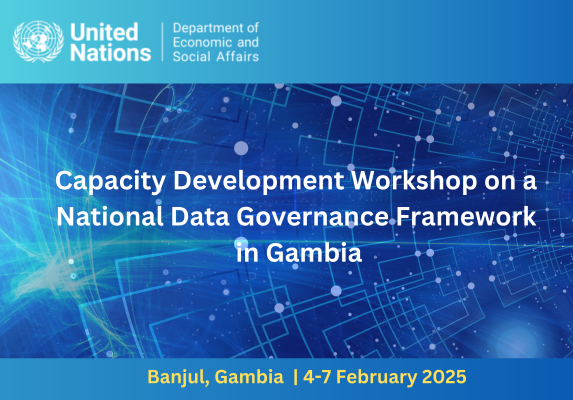UN DESA/DPIDG will be hosting a two-day capacity development workshop, in collaboration with the Ministry of Communication and Digital Economy of the Government of Republic of the Gambia, to engage government officials and other stakeholders, focusing on digital government, data, and data governance with the objective of strengthening the capacity of public sector employees in the concerned governmental organizations with regards to understanding how to improve the performance of digital government and strategize related initiatives.
The workshop is being organised under the scope of the UN Peace and Development Fund’s (UN PDF) capacity development project on “Developing institutional capacities for digital data management and cooperation to advance progress toward the Sustainable Development Goals”. The aim of the UN PDF 2030-Sub-Fund Project is to implement innovative, forward-looking and pro-active projects in support of the 2030 Agenda and the Sustainable Development Goals (SDGs).
The objectives of the National Consultation Workshop are:
● Build capacities in understanding and implementing UN DESA’s e-government development framework, guided by the UN E-Government Development Index (EGDI)
● Explore the existing opportunity and gap assessments for proposed focus areas, emerging from dialogue and interaction among workshop participants, including the proposed UN DESA data governance framework of 4 pillars and 6 elements.
● Identify the next course of action in strategic planning and implementation for setting up a national data governance framework.
● Engage stakeholders from different agencies and other non-government stakeholders to participate in the official dialogue and knowledge exchange on proposing a national data governance framework for the Gambia.
The primary thematic areas of the Workshop are as follows:
Four (4) pillars of National Data Governance: Policy, Institutions, People/Partnerships, Processes:
- Policy: existing policy and regulatory framework
- Institutions: existing institutional framework
- People: existing data ecosystem and mapping of stakeholders
- Processes: existing data processes
Six (6) elements of National Data Governance:
- Data standards and classification
- Data sharing, exchange and interoperability, including open government data
- Data security (and data protection)
- Data privacy (and ethics)
- National data infrastructure (including e.g., datacenter, cloud, data services, etc.)
- Linking data governance to digital identity)
Link to the 2030 Agenda for Sustainable Development:
Goal 8. Promote sustained, inclusive and sustainable economic growth, full and productive employment and decent work for all
Goal 9. Build resilient infrastructure, promote inclusive and sustainable industrialization and foster innovation
Goal 10. Reduce inequality within and among countries
Goal 11. Make cities and human settlements inclusive, safe, resilient
Goal 16. Promote peaceful and inclusive societies for sustainable development, provide access to justice for all and build effective, accountable and inclusive institutions at all levels
Goal 17 Strengthen the means of implementation and revitalize the Global Partnership for Sustainable Development
 Welcome to the United Nations
Welcome to the United Nations
